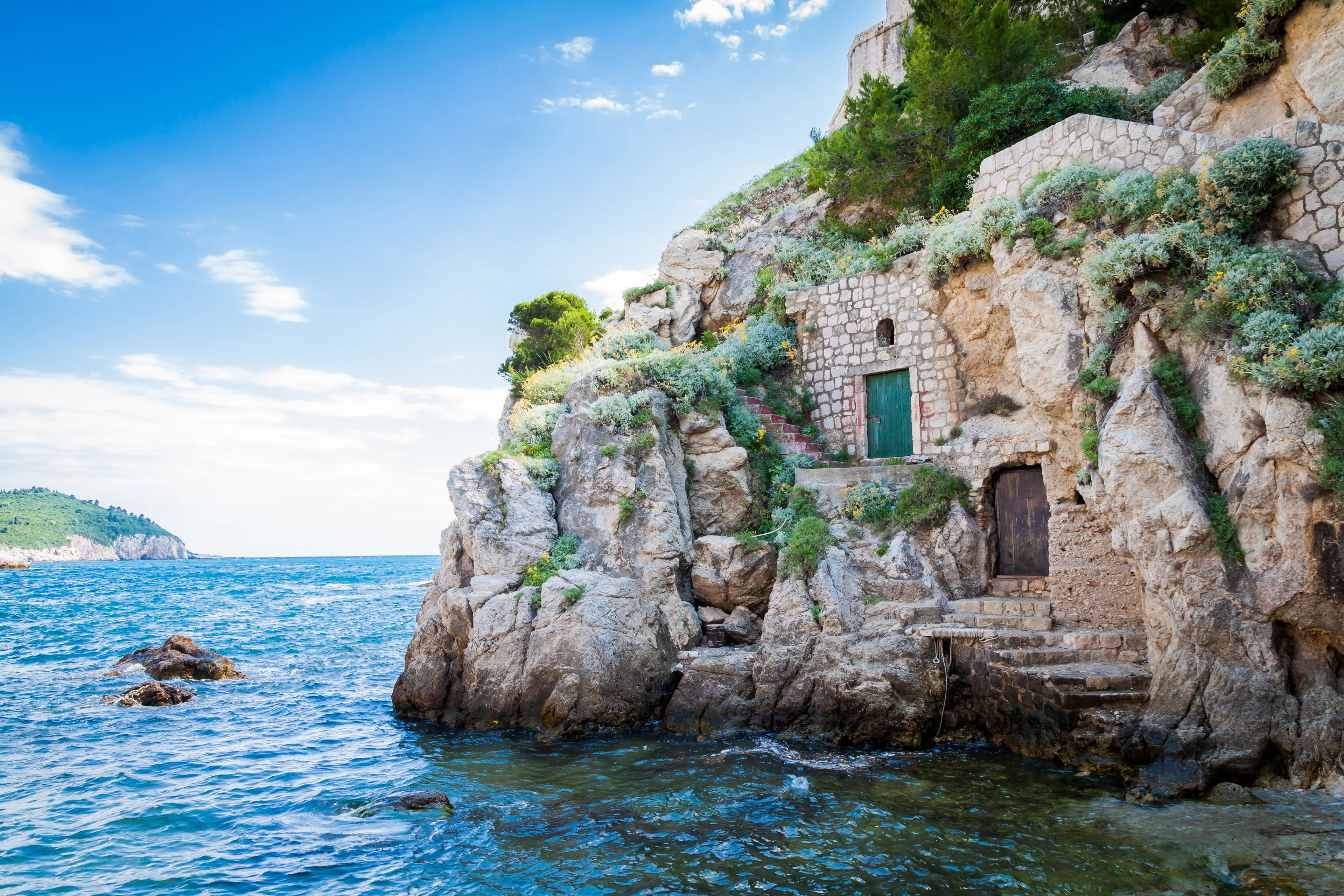2-Day Local Experience in Dubrovnik: Nightlife and Shopping with Friends
Dubrovnik, Croatia
2 days
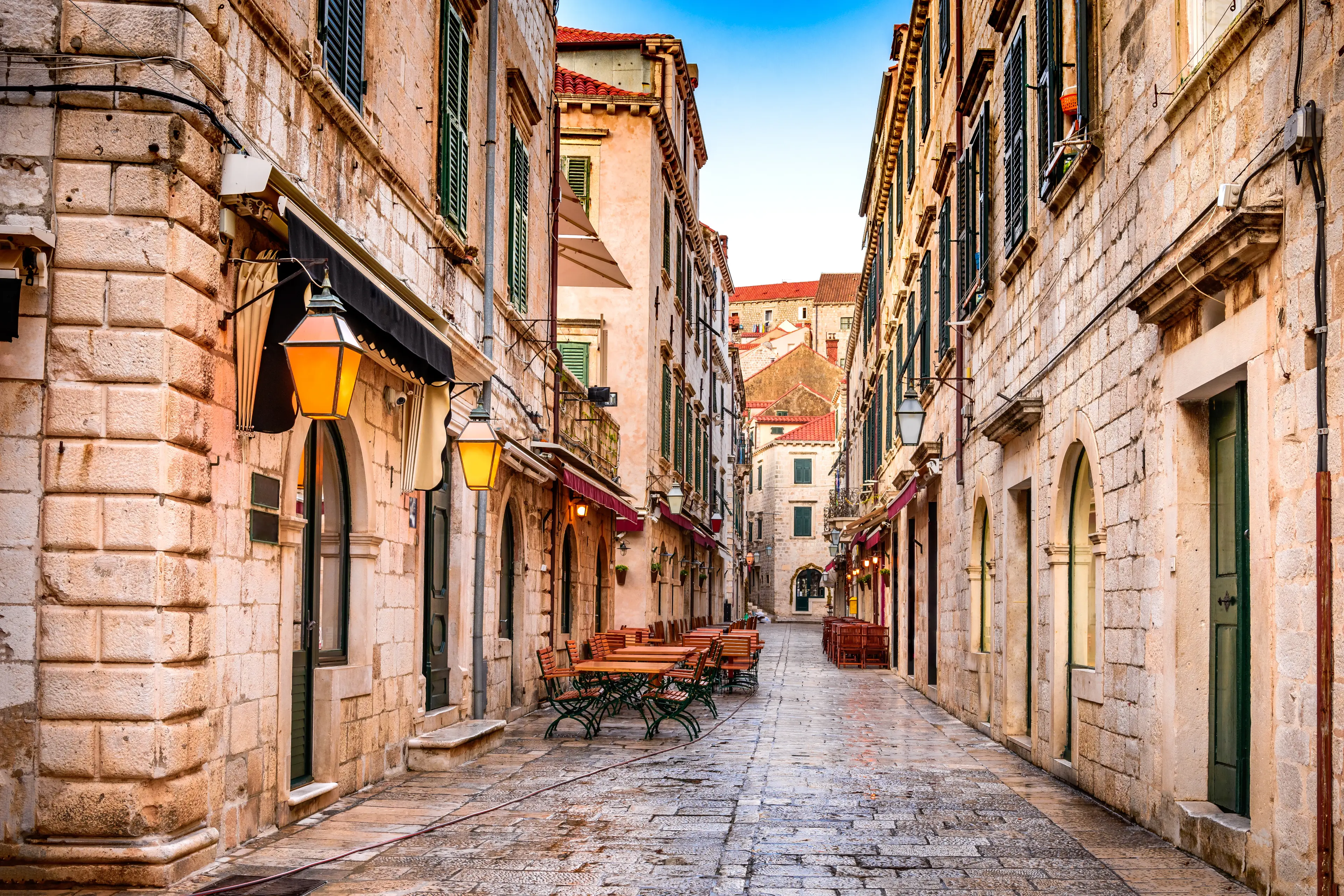
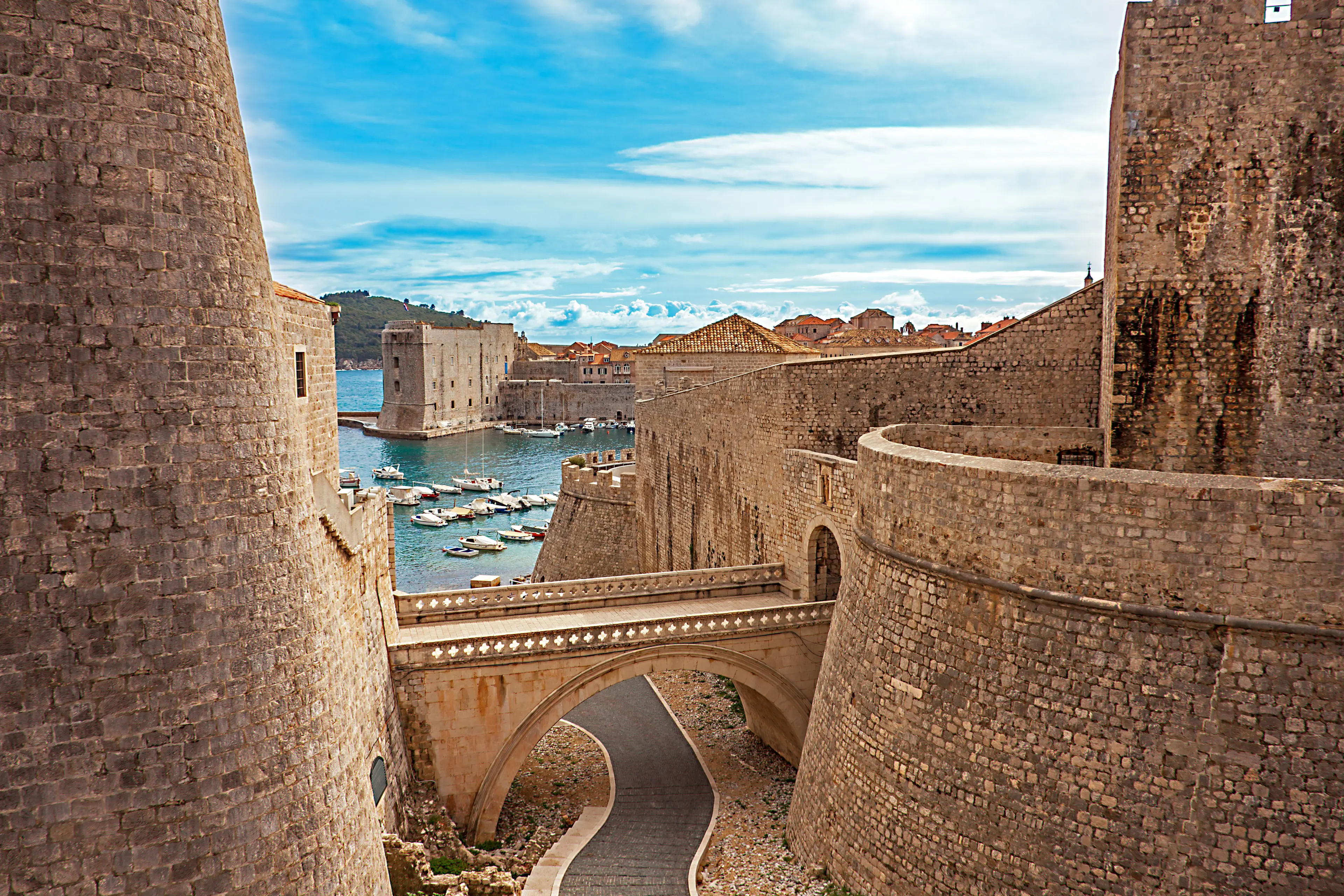
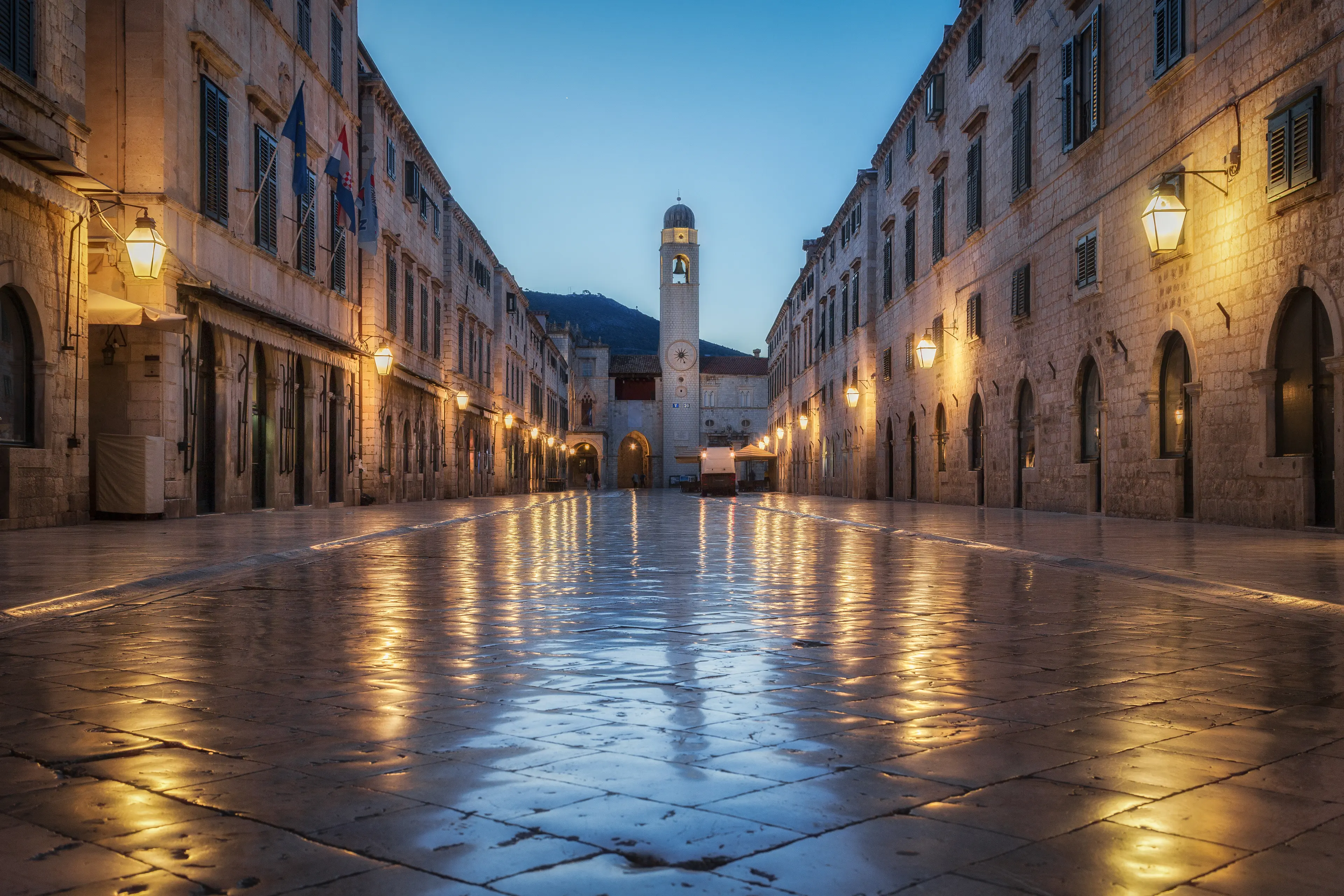
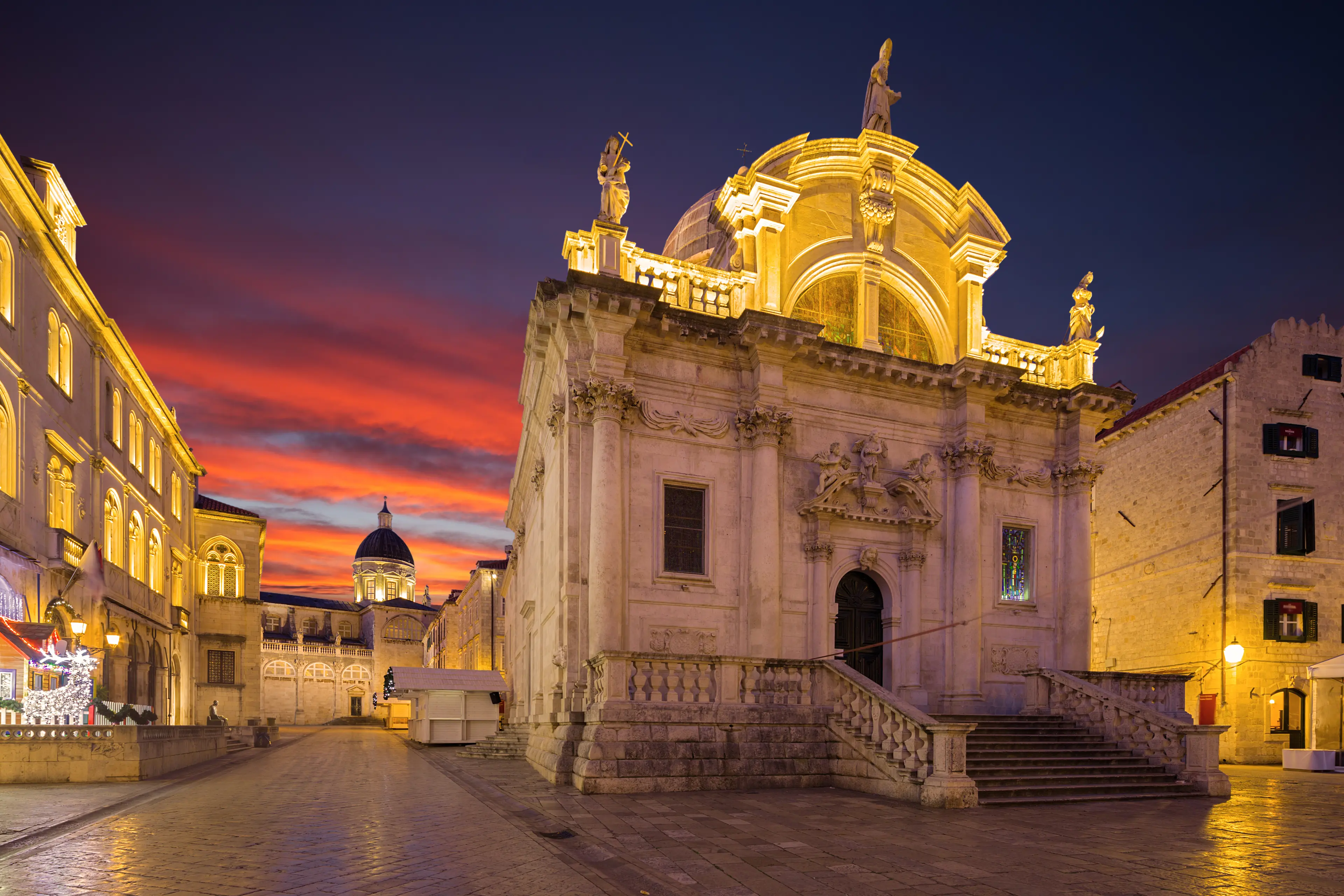

About Dubrovnik, Croatia
Dubrovnik, Croatia, known as the "Pearl of the Adriatic," is a must-visit destination for travelers seeking a blend of historical charm and natural beauty. This UNESCO World Heritage site is famous for its stunning Old Town, encircled by massive stone walls dating back to the 16th century. Explore the pedestrian-only streets, lined with Baroque buildings, lively cafes, and high-end shops. Visit the impressive Rector's Palace and the ancient Franciscan Monastery. Take a cable car up to Mount Srd for breathtaking views of the city and the Dalmatian Coast. Enjoy a boat trip to the serene Elaphiti Islands or the lush Lokrum Island. Dubrovnik also offers exquisite local cuisine and world-class wines. Experience the magic of Dubrovnik, a city where culture, history, and beauty converge.
2-Day Itinerary
Day 2
Visiting Fort Lovrijenac and Relaxing at Banje Beach
Morning
Start your second day with a visit to the Fort Lovrijenac, also known as Dubrovnik's Gibraltar. Enjoy the panoramic views of the city and the sea.
Lunch
Have lunch at a local restaurant near the fort. Try some local seafood dishes like 'grilled squid' or 'fish stew'.
Afternoon
Spend your afternoon at the Banje Beach, the city's most popular beach. Enjoy the sun, the sea, and the sand. Try some water sports like jet-skiing or paddleboarding.
Dinner
Enjoy a dinner at a local restaurant in the Old Town. Try some traditional Croatian dishes like 'peka' or 'truffle pasta'.
Evening
End your day with a nightcap at a local bar in the Old Town. Enjoy the local wines and spirits and soak in the vibrant nightlife of Dubrovnik.
Attractions in Itinerary (6)

1Old Town
The historic heart of Dubrovnik, filled with charming streets, ancient city walls, and numerous attractions.

2City Walls
The ancient city walls that surround Dubrovnik Old Town, offering stunning views of the city and the Adriatic Sea.

3Rector's Palace
A Gothic-Renaissance palace that now serves as a museum showcasing the city's history.

4Onofrio's Fountain
Onofrio's Fountain is a large public fountain located at the end of Stradun street. It was built in the 15th century and is a popular meeting spot for locals and tourists alike.

5Fort Lovrijenac
A fortress located outside the western wall of the city, offering stunning views of Dubrovnik.

6Banje Beach
The most famous beach in Dubrovnik, located near the Old Town.
Local Food and Drinks (12)

Peka
A traditional Croatian dish made by baking meat and vegetables under a bell-like dome, or 'ispod čripnje'. It's a popular dish in Dubrovnik and is often made with veal, lamb or octopus.

Crni Rižot
A black risotto made with cuttlefish or squid, rice, garlic, red wine and olive oil. The ink from the cuttlefish or squid gives the dish its distinctive black color. It's a must-try for seafood lovers visiting Dubrovnik.

Rozata
A traditional Dubrovnik dessert similar to flan or crème caramel. It's made with eggs, sugar, milk and a local liqueur called 'Rozalin' which gives it a unique flavor.

Pasticada
A stewed beef dish cooked in a special sauce, often served with gnocchi. It's a traditional Dalmatian dish that's very popular in Dubrovnik.

Ston Oysters
Fresh oysters from the nearby town of Ston. They're considered some of the best in the world and are a must-try for seafood lovers visiting Dubrovnik.

Grilled Fish
Freshly caught fish from the Adriatic Sea, grilled to perfection. It's a simple dish, but the freshness of the fish makes it a standout.

Prošek
A sweet dessert wine made from dried grapes. It's a traditional Croatian wine that's often enjoyed after dinner or with dessert.

Pršut
Croatian dry-cured ham similar to Italian prosciutto. It's often served as an appetizer and is a staple of the local cuisine in Dubrovnik.

Soparnik
A savory pie filled with Swiss chard. It's a traditional Dalmatian dish that's often enjoyed as a main course in Dubrovnik.

Rakija
A strong fruit brandy that's popular throughout Croatia. There are many different varieties, but some of the most popular ones in Dubrovnik include grape, plum, and fig rakija.

Maneštra
A hearty vegetable soup that's a staple of the local cuisine in Dubrovnik. It's often made with potatoes, beans, cabbage, and other seasonal vegetables.

Travarica
A herbal brandy made with various herbs and spices. It's a traditional Croatian drink that's often enjoyed as a digestif after meals in Dubrovnik.
Best time to visit
The best time to visit Dubrovnik, Croatia is during the spring months of April to June and the fall months of September and October. During these periods, the weather is pleasant and the city is less crowded. The summer months of July and August can be very hot and crowded, as this is the peak tourist season. However, if you're interested in festivals and vibrant nightlife, summer would be the best time to visit. Winter is quiet and peaceful, but many tourist facilities and attractions may be closed.
How to get around
City Buses
Dubrovnik's public transportation system is reliable and extensive, with buses running frequently throughout the city and surrounding areas. It's a cost-effective and efficient way to get around. Tickets can be purchased at kiosks, on the bus, or via a pre-paid card.
Taxi
Taxis are readily available in Dubrovnik and can be hailed on the street, booked in advance, or picked up from designated taxi stands. They offer a convenient, though more expensive, way to get around the city.
Ridesharing
Uber is available in Dubrovnik, offering a convenient and often cheaper alternative to traditional taxis. The app allows you to book a ride directly from your smartphone and track your driver's arrival.
Car Rental
Renting a car can be a good option if you plan to explore beyond the city. However, keep in mind that parking can be difficult in the city center and the old town is pedestrian-only.
Bicycle Rental
Dubrovnik is a bike-friendly city with several rental shops offering daily and weekly rates. It's a fun and eco-friendly way to explore the city, but be prepared for some hilly terrain.
Ferry
Ferries operate between Dubrovnik and the nearby islands, offering a scenic way to explore the region. Tickets can be purchased at the port or online in advance.
Cable Car
The Dubrovnik Cable Car offers stunning views of the city and the Adriatic Sea. It runs from the city to the top of Mount Srd, a popular spot for panoramic views.
Walk
Dubrovnik's Old Town is a UNESCO World Heritage site and is best explored on foot. The area is pedestrian-only and is filled with historic sites, charming streets, and beautiful views.
Important information
Currency€ EUR
Time zoneUTC+1
Driving sideRight
Emergency phone112
Drinking waterYes
Power sockets
Voltage230 V
Things to know about Dubrovnik, Croatia as a first time visitor
1
Dubrovnik is a coastal city in Croatia, known for its stunning old town, which is a UNESCO World Heritage site.
2
The official language is Croatian, but English is widely spoken, especially in tourist areas.
3
The local currency is the Croatian Kuna (HRK). Credit cards are widely accepted, but it's always handy to have some cash.
4
Dubrovnik has a Mediterranean climate. Summers (June to August) are hot and dry with temperatures ranging from 70°F to 90°F (21°C to 32°C). Winters (December to February) are mild and wet with temperatures ranging from 40°F to 55°F (4°C to 13°C).
5
Tipping is customary in Croatia. It's common to leave around 10% of the bill in restaurants.
6
Public transportation is reliable and affordable. The city buses run frequently and cover most of the city.
7
Taxis and Uber are also available, but can be more expensive than public transportation.
8
Dubrovnik is a pedestrian-friendly city, especially the old town, which is car-free.
9
Croatia is part of the European Union, but not the Schengen Area, so you may need a visa depending on your nationality.
10
The tap water in Dubrovnik is safe to drink.
11
Croatia uses the Type C and Type F plug. The standard voltage is 230 V, and the standard frequency is 50 Hz.
12
Dubrovnik can be very crowded during the peak tourist season (July and August). Consider visiting in the shoulder seasons (May, June, September, October) for a more relaxed experience.
13
Croatian cuisine is diverse and delicious. Be sure to try local dishes like 'pasticada', 'black risotto', and 'Dubrovnik rozata'.
14
Dubrovnik is safe, but like any tourist destination, it's important to be aware of your surroundings and keep an eye on your belongings.
15
There are plenty of supermarkets and local markets where you can buy fresh produce and local products.
16
Croatia is in the Central European Time Zone (CET), which is GMT +1.
17
Pharmacies are widely available throughout the city. Look for the sign 'ljekarna' which means pharmacy in Croatian.
18
Emergency number in Croatia is 112. This number can be dialed free of charge from most mobile networks.
19
Sunscreen is a must during the summer months as the sun can be quite strong.
20
Respect local customs and traditions. Croatians are generally conservative and appreciate when visitors respect their way of life.
Basic Croatian to know as a first time visitor
English phrase | Native phrase | Pronunciation | When to use it |
|---|---|---|---|
Hello | Bok | bohk | Greeting someone |
Goodbye | Doviđenja | doh-vee-jen-ya | Leaving or saying goodbye |
Please | Molim | moh-leem | Making a request |
Thank you | Hvala | hva-la | Expressing gratitude |
Yes | Da | dah | Agreeing or confirming |
No | Ne | neh | Disagreeing or denying |
Excuse me | Oprostite | oh-pros-tee-teh | Getting attention or apologizing |
I don't understand | Ne razumijem | neh rah-zoo-me-yem | When you don't understand something |
Do you speak English? | Govorite li engleski? | go-vor-ee-teh lee eng-les-kee | Asking if someone speaks English |
Where is the bathroom? | Gdje je kupaonica? | gdye ye koo-pa-oni-ca | Asking for the location of the bathroom |
I need help | Trebam pomoć | tre-bam po-moch | When you need assistance |
How much does this cost? | Koliko ovo košta? | ko-lee-ko o-vo koshta | Asking for the price of something |
Can I have the menu, please? | Mogu li dobiti jelovnik, molim? | mo-gu lee do-bee-tee ye-lov-nik, mo-leem | Asking for the menu in a restaurant |
I would like to order | Želim naručiti | zhe-leem na-roo-chee-tee | When you want to order something |
Water | Voda | vo-da | Asking for water |
Beer | Pivo | pee-vo | Asking for a beer |
Wine | Vino | vee-no | Asking for wine |
Check, please | Račun, molim | rah-choon, mo-leem | Asking for the bill |
Help! | Pomoć! | po-moch | In case of an emergency |
Call the police | Pozovite policiju | po-zo-vee-teh po-lee-see-yoo | In case of an emergency |
Packing List
Clothing
Lightweight clothing
Underwear
Socks
Sleepwear
Swimwear
Comfortable walking shoes
Sunglasses
Hat
Light jacket or sweater
Toiletries
Travel-sized shampoo and conditioner
Body wash or soap
Toothbrush and toothpaste
Deodorant
Razor and shaving cream
Makeup and makeup remover
Sunscreen
Insect repellent
First-aid kit
Prescription medications
Hand sanitizer
Travel documents and essentials
Passport
Driver's license or ID card
Credit and debit cards
Cash in local currency
Travel insurance documents
Hotel and transportation reservation confirmations
Emergency contact information
Electronics and gadgets
Smartphone
Charger for smartphone
Headphones
Camera
Charger for camera
Universal power adapter
Portable power bank
Miscellaneous items
Travel pillow
Earplugs and eye mask
Snacks
Water bottle
Books or e-books
Travel guide for Dubrovnik
Map of Dubrovnik
Umbrella
Reusable shopping bag
Weather Conditions
Dubrovnik, Croatia, is a beautiful city known for its stunning architecture and crystal-clear waters. However, the weather can greatly impact your travel experience, so it's essential to plan accordingly. The city experiences a Mediterranean climate, which means hot, dry summers and mild, wet winters. Summer temperatures (June to August) can reach up to 86°F (30°C), making it a perfect time for beach activities and water sports. However, it's also the peak tourist season, so expect crowded streets and higher prices. Make sure to stay hydrated and wear sun protection. Spring (March to May) and autumn (September to November) are also great times to visit. Temperatures during these seasons range from 59°F (15°C) to 77°F (25°C), providing a comfortable climate for exploring the city's historical sites. Rainfall is moderate, so it's advisable to carry an umbrella or raincoat. Winter (December to February) in Dubrovnik is mild compared to other European cities, with temperatures ranging from 41°F (5°C) to 55°F (13°C). It's the wettest season, so pack waterproof clothing. On the plus side, you'll find fewer tourists and lower prices. Regardless of when you visit, remember that weather can be unpredictable. Always check the forecast before your trip and pack accordingly. Enjoy your visit to Dubrovnik!
| Month | Hi / Lo (°C) | Weather Overview |
|---|---|---|
January | 14° / 6° | January is the coldest month in Dubrovnik, but it's still relatively mild with occasional rainfall. |
February | 14° / 6° | February is a bit warmer than January, with slightly more sunshine hours and less rainfall. |
March | 16° / 8° | March sees the start of spring, with temperatures slowly rising and the days getting longer. |
April | 19° / 11° | April is a pleasant month with moderate temperatures, ideal for sightseeing and outdoor activities. |
May | 23° / 15° | May is a beautiful month to visit Dubrovnik, with warm temperatures and blooming flowers. |
June | 27° / 19° | June marks the beginning of summer, with long sunny days and warm sea temperatures perfect for swimming. |
July | 30° / 22° | July is the hottest month in Dubrovnik, with high temperatures and plenty of sunshine. |
August | 30° / 22° | August is equally hot as July, with high temperatures and a high chance of heatwaves. |
September | 27° / 19° | September is a great month to visit, with warm temperatures and fewer crowds. |
October | 23° / 15° | October sees the start of autumn, with cooler temperatures and beautiful fall colors. |
November | 19° / 11° | November is a quiet month in Dubrovnik, with mild temperatures and fewer tourists. |
December | 16° / 8° | December is a festive month in Dubrovnik, with Christmas markets and mild winter weather. |
Did you know?
Places near by Dubrovnik, Croatia

Mostar
Known for the iconic Stari Most (Old Bridge), a reconstructed medieval arched bridge, the nearby alleys are full of shops and market stalls, and the Old Bridge Museum explores the bridge’s long history.

Korčula
A historic city known for its medieval walls and the stunning St. Mark’s Cathedral. Also, it's believed to be the birthplace of Marco Polo.

Kotor
A fortified town on Montenegro’s Adriatic coast, in a bay near the limestone cliffs of Mt. Lovćen. Known for its stunning architecture and the iconic Bay of Kotor.

Split
Known for its beaches and the fortresslike complex at its center, Diocletian's Palace, erected by the Roman emperor in the 4th century.

Mljet National Park
A large area that covers the western part of Mljet Island, which includes two salt lakes - Veliko and Malo Jezero, and the Benedictine monastery on the island of St. Mary.

Sarajevo
Known for its mix of Ottoman, Austro-Hungarian and Yugoslav influences. Notable landmarks include the Gazi Husrev-bey Mosque, the Sarajevo Cathedral, and the Sarajevo Tunnel Museum.

Hvar
A Croatian island in the Adriatic Sea, best known as a summer resort. Highlights of the port town Hvar include its 13th-century walls, a hilltop fortress and a main square anchored by the Renaissance-era Hvar Cathedral.
